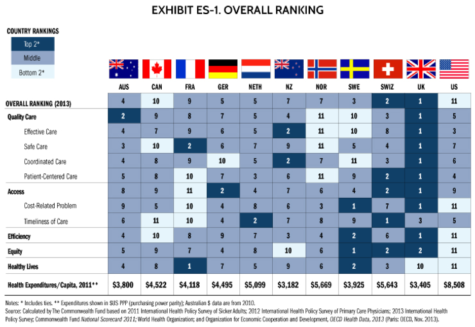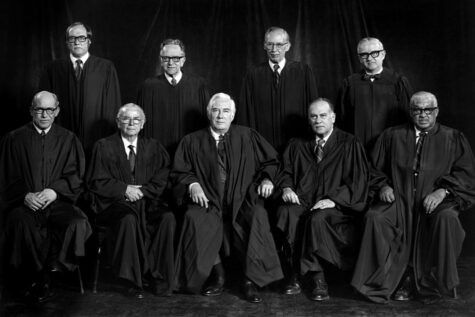The Case for Universal Healthcare
April 28, 2017
The United States needs to accept a simple fact: healthcare is a right, not a privilege.
Thirty two countries in the world have universal healthcare coverage for their citizens. Of the 25 wealthiest countries, the US is the only one that doesn’t. As of now, the US is under the Affordable Care Act (ACA), a healthcare plan passed by President Obama in 2010. The plan was designed to increase coverage while reducing costs, but it still requires Americans to purchase insurance. It’s based on the idea that your insurance depends on what you can afford. A step in the right direction, but by no means the final solution.
Three months after Donald Trump took office, a replacement plan was put together to take the place of the ACA. The plan was struck down by house republicans before there was even a vote.
The ACA was not a perfect plan. Premiums weren’t affordable to everyone, but the GOP’s replacement efforts are the last thing the people of the United States need.
What the US needs is a universal healthcare plan. According to the Public Broadcasting Service, 44 million Americans live without health insurance, and 38 million have coverage that is deemed “inadequate.” It is a sad reality when one of the richest countries in the world allows a quarter of their people to go without reliable health insurance, something that does not happen in any other developed countries.
That was put on display in a 2014 study by the Commonwealth Fund. The study examined the health care systems of 11 countries. The countries were then ranked in 13 categories.

Of the 11 countries, the US was the only nation without some form of universal healthcare coverage (Australia, France, Norway, Sweden, Switzerland, and the UK are fully government funded). And perhaps not so surprisingly, the US ranks in the bottom three in six areas and dead last in five, one of them being the overall ranking.
“Yet, the other 10 countries spend considerably less on healthcare per person and as a percent of gross domestic product than does the United States. These findings indicate that, from the perspectives of both physicians and patients, the U.S. health care system could do much better in achieving value for the nation’s substantial investment in health,” the study concludes.
Different nations use different variations of universal healthcare. A look at the book Healing of America: A Global Quest for Better, Cheaper, and Fairer Health Care by T.R. Reid shows there are four types of healthcare systems, three of which involve universal coverage. The first is the Beveridge model, which is used by Great Britain, Spain, New Zealand, and others, as well as “the extreme application of the Beveridge approach” used by Cuba. In this model healthcare is paid for entirely through taxation and the majority of hospitals are government owned.
Secondly, there’s the Bismarck model, a plan that is similar to the United States’s.. It’s paid for by employers and through paycheck deductions. The one difference is that in countries that utilise the Bismarck model, such as Germany and France, insurance plans don’t make profits and must cover everyone.
The third model is National Health Insurance. Using elements of the Beveridge and Bismarck models, payment for private-sector providers comes from a government insurance program, a single-payer system. Canada is a prime example of the NHI model.
The fourth is the Out-of-Pocket model. As the system for the majority of nations, the Out-of-Pocket model does not use insurance or mass medical care, rather it requires citizens to pay for their care out of pocket. This model is used by undeveloped countries.
Each of the first ten countries featured in the Commonwealth Fund’s study uses one of Reid’s first three models. America’s healthcare system is so expensive and unjust because it uses all four of these models. As Reid’s book states, we use the Beveridge model for veterans, the Bismarck model for the insurance covered jobs, and the NHI model for the elderly.
Unfortunately, America makes use of the system in place for undeveloped nations as well. 44 million people rely on the Out-of-Pocket model. This inconsistent system cannot provide the right type of care for all citizens.
The goal for the US should be to move towards a healthcare system that provides equal coverage for all citizens, a characteristic of especially the Beveridge and Bismarck models.
It is the responsibility of the government and the people of the US to guarantee everyone an equal opportunity to live a healthy life. Healthcare has turned into a corporate money maker with three for-profit companies owning more than 30 percent of market share. According to the LA Times, the average US patient’s stay at a hospital came to a grand total of $15,734. Granted, many of these patients have the help of insurance to aid them with these costs, but at the same time, many do not.
Prescription drugs for cancers and other diseases can cost over $10,000 a month, a cost that has doubled in the last decade. The reason for outrageous costs is simple. Companies are essentially buying out rights to drugs, meaning only they can produce them. This gives them the ability to raise prices exponentially without fear of losing consumers. The US government provides very little regulation of these prescription drugs, as opposed to some European countries such as France and Germany. These countries will deny some drugs to be sold, most of them being useless but expensive medicines. By the state using the ability to deny the sale of some prescription medicines, drug corporations are forced to produce helpful drugs with reasonable prices.
This practice of denying prescription drugs in European nations connects to universal healthcare because it involves strong government influence in how the system works, as opposed to allowing the market to decide the spread and cost of medicine. Yet another way universal healthcare is a benefit to society.
The facts do nothing but commend the aspect of universal healthcare coverage. All people deserve treatment: equal treatment, regardless of income. Members of a wealthy society should not have to worry about paying for expensive hospital bills and skyrocketing drug costs. The government should not be spending ridiculous amount of money on health expenditures, only to provide inadequate treatment for a large number of citizens.



